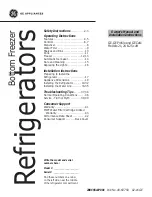
6
5. Using a grounded drill, drill a
¹⁄₄
" (6.35 mm) hole in the cold
water pipe you have selected.
6. Fasten shutoff valve to cold water pipe with pipe clamp. Be
sure outlet end is solidly in the
¹⁄₄
" (6.35 mm) drilled hole in the
water pipe and that washer is under the pipe clamp. Tighten
packing nut. Tighten the pipe clamp screws carefully and
evenly so washer makes a watertight seal. Do not overtighten
or you may crush the copper tubing, especially if soft (coiled)
copper tubing is used. Now you are ready to connect the
copper tubing.
7. Slip compression sleeve and compression nut on copper
tubing as shown. Insert end of tubing into outlet end squarely
as far as it will go. Screw compression nut onto outlet end
with adjustable wrench. Do not overtighten.
8. Place the free end of the tubing into a container or sink, and
turn ON main water supply and flush out tubing until water is
clear. Turn OFF shutoff valve on the water pipe. Coil copper
tubing.
Connecting to Refrigerator:
NOTE: The first step for connecting the water line to your
refrigerator is different depending on the type of water valve
provided with your refrigerator. See the diagrams below to
determine the style of valve you have. (On kit models, assemble
water valve to refrigerator per kit instructions.)
1. For Style 1, disconnect the tube clamp on the back of the
product and insert the copper tubing through the clamp, as
shown. Remove the tape label from the valve inlet and insert
copper tubing until it bottoms out (approximately
³⁄₄
"
[1.9 cm]). Tighten nut by hand as much as possible; then turn
the nut an additional
¹⁄₂
turn using a wrench. Do not
overtighten. Reattach the tube clamp and tube to the back of
the cabinet. Skip to Step 2.
For Style 2, disconnect the tube clamp on the back of the
product and insert copper tubing through the clamp as
shown. Attach the copper tube to the valve inlet using a
compression nut and sleeve as shown. Tighten the
compression nut. Do not overtighten. Reattach the tube
clamp and tube to the back of the cabinet. Move to Step 2.
Style 1
Style 2
2. Turn shutoff valve ON. Check for leaks. Tighten any
connections (including connections at the valve) or nuts that
leak.
3. The ice maker is equipped with a built-in water strainer. If
local water conditions require periodic cleaning or a well is
your source of water supply, a second water strainer should
be installed in the
¹⁄₄
" (6.35 mm) water line. Obtain a water
strainer from your nearest appliance dealer. Install at either
tube connection.
4. Plug in refrigerator or reconnect power.
Refrigerator Doors
TOOLS NEEDED:
⁵⁄₁₆
" hex-head socket wrench, #2 Phillips
screwdriver, flat-blade screwdriver,
⁵⁄₁₆
" open-end wrench, flat 2"
putty knife.
IMPORTANT:
■
Before you begin, turn the refrigerator control OFF, unplug
refrigerator or disconnect power. Remove food and any
adjustable door or utility bins from doors.
■
If you are only removing and replacing the doors, the
instructions are the same regardless of door style. See
“Remove Doors and Hinges” and “Replace Doors and
Hinges” later in this section.
■
Depending on your model, you may have standard Style 1 or
contour Style 2 doors. If you are also going to reverse the
door swing, follow the instructions for the appropriate door
style.
■
All graphics referenced in the following instructions are
included later in this section after “Final Steps.”
Remove Doors and Hinges
⁵⁄₁₆
" Hex-Head Hinge Screw
1. Unplug refrigerator or disconnect power.
2. Open refrigerator door and remove base grille from the
bottom front of the refrigerator. See Base Grille graphic.
3. Close the refrigerator door and keep both doors closed until
you are ready to lift them free from the cabinet.
NOTE: Provide additional support for the doors while the
hinges are being moved. Do not depend on the door magnets
to hold the doors in place while you are working.
A. Cold Water Pipe
B. Pipe Clamp
C. Copper Tubing
D. Compression Nut
E. Compression Sleeve
F. Shutoff Valve
G. Packing Nut
A. Tube Clamp
B. Copper Tubing
C. Compression Nut
D. Valve Inlet
A
B
C
D
E
F
G
A
B
C
D
A. Tube Clamp
B. Copper Tubing
C. Compression Nut
A
B
C
Summary of Contents for 8ET8MTKXKT04
Page 1: ...TOP MOUNT REFRIGERATOR Use CareGuide 2302300 ...
Page 19: ...19 Notes ...






































